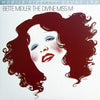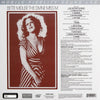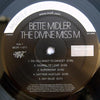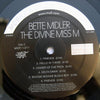







Bette Midler – The Divine Miss M (MOFI Silver Label, Ultra Analog)
ORDER LIMITED TO ONE ITEM PER CUSTOMER
Bette Midler – lead vocals [click here to see more vinyl featuring Bette Midler]
Cissy Houston – backing vocals (A1)
Tender Loving Care (Renelle Broxton, Diedre Tuck, Beverly McKenzie) – backing vocals (A1)
Gail Kantor – backing vocals, (A2-4, B3-4, B6)
Melissa Manchester – backing vocals, (A2-4, B3-4, B6)
Merle Miller – backing vocals, (A2-4, B3-4, B6)
Michael Federal – bass guitar, backing vocals (B4)
Milt Hinton – bass (B5) [Click here to see more vinyl featuring Milt Hinton]
Ron Carter – bass guitar [click here to see more vinyl featuring Ron Carter]
Barry Manilow – piano and rhythm track
Dickie Frank – guitar
David Spinozza – guitars
Ray Lucas – drums
Kevin Ellman – drums
Ralph MacDonald – percussion instruments
Pat Rebillot – piano (B1)
Gene Orloff – violin (B1)
Emanuel Green – violin (B1)
Selwart Clarke – viola (B1)
Kermit Moore – cello (B1)
Don Arnone – guitar, (B5)
Dick Hyman – piano (B5)
Ted Sommer – drums, (B5)
Thom Bell – horn and string arrangement (A1)
William S. Fischer – string arrangement (B1)
Marty Nelson – vocal arranger (B5)
Arif Mardin – arrangement (B5)
Barry Manilow – musical arranger, musical conductor
Written by Bobby Freeman (A1), Jeff Barry (A2), Ellie Greenwich (A2), Phil Spector (A2), Bonnie Bramlett (A3), Leon Russell (A3), Jeff Kent (A4), Harry Akst (A5), Grant Clarke (A5), Mark Klingman (B1, B6), Buzzy Linhart (B1, B6), John Prine (B2), George Morton (B3), Barry, Greenwich (B3), Larry Collins (B4), Alex Harvey (B4), Don Raye (B5), Hughie Prince (B5)
1LP, standard sleeve
Limited numbered edition
Original analog Master tape : Silver Label (Copy of original Mastertape)
Heavy Press : 180g
Record color : black
Speed : 33 RPM
Size : 12'’
Stereo
Studio
Record Press : RTI
Label : MOFI
Original Label : Atlantic
Recorded 1971–1972 at Atlantic Recording Studios (New York City)
Engineered by Lew Hahn
Remixed by Bob Liftin (A1, B1-2, B5), Geoffrey Haslam (A2, A4-5, B3), Lew Hahn (A3, B4, B6) at Regent Sound Studios and Atlantic Studios
Produced by Joel Dorn (A1, A5, B1-2, B5), Ahmet Ertegün (A2-4, B3-4, B6), Barry Manilow (A2-4, B3-4, B6), Geoffrey Haslam (A2-4, B3-4, B6)
Originally released in November 1972
Reissued in May 2011
Tracks:
Side A:
- Do You Want To Dance?
- Chapel Of Love
- Superstar
- Daytime Hustler
- Am I Blue?
Side B:
- Friends (Session 1)
- Hello In There
- Leader of the Pack
- Delta Dawn
- Boogie Woogie Bugle Boy
- Friends (Session 2)
Reviews :
“Bette Midler was one of the last major artists who emerged from the traditions of nightclub performing, after rock & roll changed the rules of the music business, though she was a singer capable of working both sides of the fence. Midler's approach bore more than a passing resemblance to the traditions of supper-club performers wearing their hearts on their sleeves for the audience, but she could balance sincerity and a deep respect for songcraft with a large dose of camp and broad humor, coupled with a love of R&B and girl group sounds that put her within a stone's throw of rock. (And if the nightspot where Midler first found her audience was a gay bathhouse in New York, that was just one more wrinkle that separated her from the major nightclub acts of the '50s and '60s.) Midler's 1972 debut album, The Divine Miss M, gave her an ideal introduction to the listening audience, a set that honored her brassy and introspective sides with equal care and skill. While Midler was and is best known for her outgoing stage persona, numbers like "Am I Blue" and "Do You Want to Dance?" demonstrate how much emotional heat she can bring to a torch song, and her interpretations of "Delta Dawn" and "Hello in There" are powerful, moving stuff, portraying their characters with a palpable compassion and nuance. Midler's loving renditions of "Chapel of Love" and "Leader of the Pack" show how much she learned from Brill Building pop, and "Friends," which opened and closed side two, made clear Midler could wrap some very complicated emotions in a catchy (but smart) pop tune. And the production (half by Joel Dorn, half by Geoffrey Haslam, Ahmet Ertegun, and Midler's then musical director, Barry Manilow) knows when to move in close to catch the sweet grain of her voice and when to step back and take in the whole show. If Midler matured as a performer with time, The Divine Miss M remains her best album, one that captured the many facets of her musical personality beautifully and showed her quirks were a rich part of what made her music so powerful.” Review by Mark Deming
Ultra Analog™ : The GAIN 2 Ultra Analog™ Series stems from the use of the Gain 2 system, mastered at half speed from the original master tapes where possible, capturing and uncovering as before undiscovered sonic information.
Half-speed mastering. In half-speed mastering, the whole process is slowed down to half of the original speed. A typical 33 1/3 rpm record is cut at 16 2/3 rpm. The source material is also slowed down (reducing the pitch in the process) meaning the final record will still sound normal when played back. Slowing the whole process down allows more time, which means the end result sounds better and is more efficient — allowing engineering to minimize the effects of inherent limitations within the vinyl format. The result is a more accurate and more open high-frequency response in the half speed vinyl when compared with a normal speed recording.
Ratings :
Discogs : 4.26 / 5 ; AllMusic : 4.5 / 5

